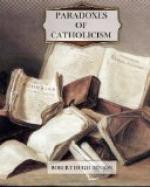Yet even now Reason’s work is not done, though its scope in future is changed. Reason no longer examines whether He be God; Faith has accepted it: yet Reason has to be as active as ever; for Reason now must begin with all its might the task of understanding His Revelation. Faith has given them, so to speak, casket after casket of jewels; every word that Jesus Christ henceforth speaks to them is a very mine of treasure, absolutely true since He is known to be a Divine Teacher Who has given it. And Reason now begins her new work, not of justifying Faith, but, so to say, of interpreting it; not of examining His claims, since these have been once for all accepted, but of examining, understanding, and assimilating all that He reveals.
III. Turn now to Catholicism.
It is the Catholic Church, and the Catholic Church only, that acts as did Jesus Christ and offers an adequate object to Reason and Faith alike. For, first, it is evident that if Christ intended His Revelation to last through all time, He must have designed a means by which it should last, an Authority that should declare and preserve it as He Himself delivered it. And next, it is evident that since the Catholic Church alone even claims that prerogative, clearly and coherently, her right to represent that Authority is in proportion to the clearness and coherence of her claim. Or, again, she advances in support of that claim precisely those same credentials as did He: she points to her miracles, her achievements, the fulfilment of prophecy, the unity of her teaching, the appeal to men’s moral sense—all of them appeals to Reason, and appeals which lead up, as did His, to the supreme claim, which He also made, to demand an Act of Faith in herself as a Divine Teacher.
For she alone demands it. Other denominations of Christendom point to a Book, or to the writings of Fathers, or to the example of their members, and she too does these things. But it is she alone who appeals to these things not as final in themselves, not as constituting in themselves a final court of appeal, but as indicating as that court of appeal her own Living Voice. Believe me, for the works’ sake, she too says. “Use your reason to the full to examine my credentials; study prophecy, history, the Fathers—study my claims in any realm in which your intellect is competent—and then see if it is not after all supremely reasonable for Reason to abdicate that particular throne on which she has sat so long and to seat Faith there instead? Certainly follow your Reason and use your private judgment, for at present you have no other guide; and then, please God, aided by Faith, Reason will itself bow before Faith, and take her own place henceforth, not on the throne, but on the steps that lead to it.”




